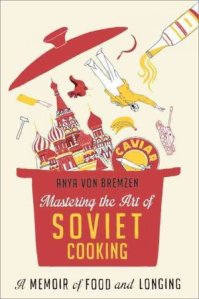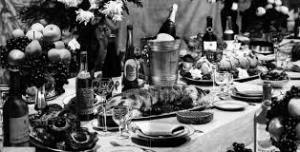Anya von Bremzen
Crown Publishers, 2013
 This book circled back to me because I gave it to my mother for Christmas. She traveled to the USSR in 1978 and she loves travel and cookbooks. It seemed like a slam dunk present and it was. So much so that she wanted to share it with me. She loved when von Bremzen wrote her family story that takes the reader from the 1910s to the 2000s.
This book circled back to me because I gave it to my mother for Christmas. She traveled to the USSR in 1978 and she loves travel and cookbooks. It seemed like a slam dunk present and it was. So much so that she wanted to share it with me. She loved when von Bremzen wrote her family story that takes the reader from the 1910s to the 2000s.
Every chapter is a decade that combines history, family story, and of course reminiscences on food, or in this case, often the lack of it. Don’t expect a reference book anywhere near Julia Child’s iconic Mastering the Art of French Cooking. The title is misleading as an attempt to slide in under Child’s fame, which is too bad because it also is unnecessary.
The book has a merit of its own. It is a generational recap without the messiness of a soul emptying memoir that includes ample politics and history to give a clearer picture of history no one ever learned in high school. Simplistically, the U.S. has a history of only a few centuries that has been defined by westward expansion and the power of individualism. For thousands of years, Russian history has been defined by a long series of despot leaders who took advantage of an uneducated and hungry people.
Von Bremzen comes from a family that at times struggles to survive living in a state-
owned apartment the size of a trailer with several families though her grandfather is in the respected intelligence work during the Cold War. Mother Larisa came from a loving, relatively secure family, though not many American memoirists with the same description could tell of grandma’s walking trip to claim a philandering grandpa and inadvertently spend the night in a battle trench with frozen amputated arms and legs. Von Bremzen’s father grew up as much on the streets as he did in the apartment where his cheery, lovable prostitute mother lived.
Mom Larisa was the dreamer who as a child believed there was more and someday she would experience it. It took until 1974, when von Bremzen was a young teenager, but at last the two of them emigrated to the U.S. The memoir is sketchy at this point but there is good information about the shock of American food that is equally divided between awe and disgust. No longer in the country of potato peel pancakes and millet, she was appalled by bad bread and flavorless strawberries.
More than a book of food and history, this is a peek into Russian character. There is a wicked sense of humor and six interesting paradoxes of “mature socialism”. They start with “There’s no unemployment but no one works,” and ends with “No one is satisfied, but everyone votes yes.”
Don’t read this book for the recipes though there are a few tucked in the back as an afterthought. A few would be worth trying out of curiosity. The nostalgic childhood invitation to Russian food is as if I told you about a childhood 4th of July picnic. I’d love to be there enjoying it with you, but I don’t need to make it. Instead, enjoy the book as a brush-up on modern Russia, food history, and an emigrant’s life who made good.




Sounds very interesting. How neat that you stumbled upon the book. How did you hear about it?
I think it was a book review on NPR, not long before Christmas when I needed to think about other people. (Sometimes I need a nudge to to do that.)
How European and Russian. This is right up my alley. Thank YOU, Rebecca, for the introduction. I’ll be on the lookout for this read as I know I shall enjoy this. 😀
So does that mean you have an interest or a bloodline into Europe and Russia? It was a good book. Equal parts history, memoir and food.
I am European and I have know a number of Russian people in my time. Sounds an interesting read. 🙂
Always good to remember how good we actually have it. –Curt
Well, I certainly know you would agree we have it good materially, but I also know you know people are always happy and proud with what they have. It’s only when despots make life unbearable that happiness and true living are difficult. Russia’s had its share.
The title got my attention, Russian cooking not ordinarily one you hear chefs touting their passion for. You know, fifty ways to use potatoes… My husband’s Gram Szul always insisted those who visited her must EAT! EAT! I’l have to check the library for this one soon.
Potatoes were a part of it, but there was more. I think the author’s passion came from her childhood. Our childhood food is always very evocative.
Just finished a beginners Russian course…cooking Russian food is probably much, much easier! lol 😉 I completed a full Polish course first so it could have been much much worse given the similarities that saved me 😉 But I’ve worked up a hearty appetite after all that studying so if you’re cooking Russian tonight… 😀
You don’t avoid the hard subjects, I can tell. Yes, I think cooking would be far easier than language. I haven’t mastered my own. I do try fumbling with Spanish from time to time. Thanks for stopping by and commenting! I’ll let you know when I cook Russian. 🙂 Would potato soup count? I’d add bacon or ham for you, cheese for myself, now I’m working up an appetite.
I enjoyed your review and the book cover is very intriguing. The tank an interesting addition to the ‘soup’.